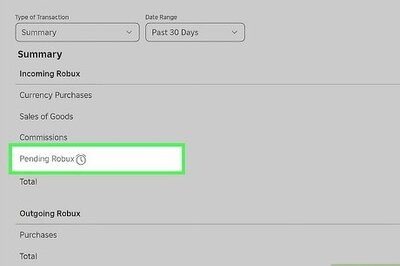
views
Use cough drops for instant relief.

These lozenges reduce coughing and congestion. Cough drops contain menthol, which opens up the airways thanks to its aromatic properties. Though they’re not medicinal, they can ease your symptoms and give you a break if you’ve been coughing all day. Buy cough drops that include ingredients like honey, lemon, eucalyptus, and mint to help ease your coughing symptoms.
Try honey to ease nighttime coughing.

Some studies show that honey suppresses coughing. A study published by the Cochrane Library found that honey was able to effectively reduce cough symptoms. To try out this method, mix 2 teaspoons (9.9 mL) of honey in hot water or tea. Drinking this relaxing beverage before bedtime can also help you fall asleep faster and lessen any nighttime coughing fits. Don’t give honey to children under 1. This can result in a rare condition called infant botulism. Honey can also be used to soothe a sore throat brought on by coughing.
Sip on some warm, tasty soup to stop coughing.

Warm liquids like soup ease congestion. They can also increase the movement of nasal fluids. Both work to help you cough less. Try chicken noodle soup or even warm broth if you're looking for some relief. It will also help you stay hydrated, too! If you’re feeling nauseous or don’t have much of an appetite, try sipping on chicken or vegetable broth. It will provide the same relief! Try a low-sodium variety so that you don’t end up feeling dehydrated.
Gargle salt water to ease coughing brought on by congestion.

A saltwater rinse can clear out the mucus in your system. This can help ease symptoms, as mucus dripping down into your throat can make your cough a lot worse. Place ⁄4 teaspoon (1.2 mL) to ⁄2 teaspoon (2.5 mL) of salt in a glass of warm water. Stir the salt until it's fully dissolved. Gargle the water for 1-2 minutes, then spit it out. Be sure that you don’t swallow it! Do this 3 times a day until your symptoms subside. If the salt irritates your mouth or throat, you can also use plain, distilled warm water for gargles. Alternatively, you can add some essential oil to a pot of moderately hot water and inhale steam. A steamy shower may also be helpful.
Keep your head elevated when you sleep.

Doing this keeps mucus from being blocked in the sinuses and throat. This will improve your airflow and help you breathe easy as you fall asleep! Prop up the pillow under your head so that it supports the natural curve of your neck.
Utilize a humidifier to add moisture to the air.

Dry air makes it harder for mucus to drain, which triggers coughs. Use a humidifier in your bedroom or living room to add moisture to the air and help you clear your sinuses. The air should range from 30% to 55% humidity. If the humidity is too high, mold and dust mites may thrive, both of which are common causes of allergies and coughs. If the humidity falls too low, it may cause dry eyes, throat and sinus irritations. Remember to clean your humidifier often! Contaminated humidifiers can be breeding grounds for mold and bacteria.
Try an air purifier to clear the air of allergens.

Floating particles like pollen and mold may be causing your cough. An air purifier, like a HEPA filter, traps these allergens and has a 99.9% effectiveness rate. Keep an air purifier in your room or living room to make sure the air isn’t making your cough worse! An air purifier is especially helpful if you struggle with chronic allergies or asthma symptoms. Change and clean the filter often according to instructions on the box.
Drink plenty of water.

Liquids help loosen congestion, providing relief to your cough. Drink water, juice, warm broth, or hot water with lemon for the best results. Aim for 2.7 to 3.7 litres (91 to 125 fl oz) of water a day. If your coughing is accompanied by symptoms like fever, nausea, and diarrhea, it's really important that you drink plenty of fluids. This will help you stay hydrated and get back to your healthy self. Stay away from coffee, soda, and alcohol. These can dehydrate you.
Get 8-10 hours of rest each night.

Rest helps reinvigorate your immune system. Get plenty of sleep to kick your cough, and make sure that’s in the range of 8-10 hours each night. You should also avoid strenuous exercise while you have a cold, as this can zap your energy and leave you feeling worse.
Try echinacea supplements.

Some studies show these can shorten the duration of your cough. A study published by the Cochrane Library found that the supplements were able to shorten the duration of a cold by a half-day. The findings also suggested that they can decrease the severity of cough symptoms. Though more medical research is needed, echinacea supplements may be able to provide some relief. Be sure to talk to your doctor before taking them. Once you get the go-ahead, take the supplements as directed for 7-10 days upon your first cold symptoms. Never exceed the recommended dosage on the label. Avoid using echinacea when you're pregnant. Reports vary on whether the natural supplement is safe for people to ingest during pregnancy, so it's best to stay on the safe side and pick a different cough remedy.
Quit smoking tobacco.

Smoking leads to respiratory illnesses and chronic coughing. You're also more likely to develop a cold or flu if you smoke regularly, as it weakens your immune system. Consider quitting smoking to alleviate this risk and reduce symptoms. If you want to quit smoking, websites like https://smokefree.gov or https://lung.org can provide additional resources. Secondhand smoke can also cause side effects like coughing.
Visit your doctor if your cough persists.

Persistent coughing can be a symptom of an underlying condition. If you experience a cough alongside a sore throat, high fever, whooping cough, or postnasal drip (mucus running down the throat), make an appointment with your doctor. These could be signs of an underlying infection, like pneumonia, whooping cough, a sinus infection, or COVID-19. If you cough up blood or are experiencing difficulty breathing, seek emergency medical care immediately. Depending on your symptoms, your doctor will perform a physical exam to look at your throat, ears, and nasal passages.


















Comments
0 comment